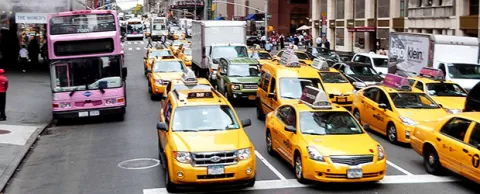
The greenest city in the U.S. isn’t the one with the most electric cars or most reusable grocery bags. It’s New York City.
Surprised? New York City leads in green transportation and that plays a surprisingly large role in a city’s overall sustainability and prosperity, according to a study by WalletHub, a personal finance site.
Green transportation makes a big difference
The study gave New York the highest marks for green transportation. Its environmental quality, use of green energy and green policies each ranked fifth.
Portland, Oregon and San Francisco ranked second and third respectively. While they took the top two spots for local policies, Portland's transportation came in 13th place. San Francisco's overall environmental quality ranked 12th.
Washington, D.C. and Honolulu rounded out the overall top 5.
Focus on transit
If you think only of driving and finding a place to park, you may think of New York City as one of the worst places to commute. A study by the traffic firm Waze, however, finds that isn’t the case.
While there are plenty of New Yorkers who do have marathon commutes that can last hours, on average the city does well by international standards. Its commute times approach 10% faster than other big cities, like Jakarta and Manila.
To help commuters move quickly, New York has a well-established subway system that's effective in getting people where they need to go. Bicycle rentals are also growing in popularity.
Transit and prosperity
There does seem to be some correlation between overall economic prosperity and how easy it is to commute. CityLab and the Martin Prosperity Institute developed a list of the world's 25 most economically powerful cities. New York sits firmly on top of the list.
Beyond NYC, London and Paris also rank within the top five. All three placed average or better for commute times for large cities. Only Tokyo and Hong Kong ranked high for prosperity and poor for travel times, although both are making inroads on the latter.
United Nations effort
Because of its impact on sustainable development, transportation is one of the cornerstones of the Goal 11 initiative by the United Nations. In addition to increasing affordable housing, improving basic services and reducing the impacts of disasters, the UN specifically calls out transit as one of the areas that cities must focus on.
By 2030, it directs cities to provide all citizens with access to safe, affordable, accessible and sustainable transport systems and improve road safety, mainly by expanding public transportation. It also calls on cities to give special attention to the needs of those in vulnerable situations, women, children, persons with disabilities and older persons.
More stories …
Brussels relinquishes "worst traffic" title; see how it’s doing it
U.S. traffic headaches grow steadily worse, roads alone can’t cure them
Battling traffic jams with smarter traffic signals



